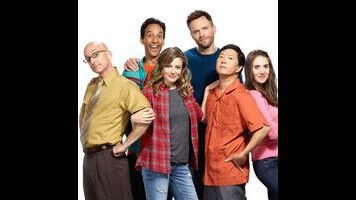As Community moves to a new home, its old one tries to revive its comic voice

It hasn’t been a fruitful season for comedy on NBC. A To Z and Bad Judge met with swift cancellations, and the fates of Marry Me and About A Boy remain undecided. At mid-season, the network programmed an entirely comedy-free Thursday night, rendering the former home of Must See TV a non-sitcom zone for the first time since the fall of 1980. While the Lorne Michaels empire ensures NBC’s dominance in late-night laughter, the network’s big splashes in primetime comedy have involved letting shows go: Parks And Recreation’s stellar final season, or Unbreakable Kimmy Schmidt’s break for Netflix (and immediate second-season pickup). This trend was heralded by Community’s last-minute stay of execution, granted not by the broadcast overlords who saw fit to reinstate creator Dan Harmon for season five, but by Internet giant Yahoo. Beginning Tuesday, March 17, the show’s prophesied sixth season (whither the movie?) begins rolling out not on TV, but on the same online platform that hosts 40 years of digitized Saturday Night Live.
A show about the risks and rewards of starting over, Community has had plenty of opportunity to practice what it preaches. Its first reset went bust, but the return of key creatives Harmon and Chris McKenna provided the show’s fifth-season comeback with steady hands and a familiar tone. Born again for the web—whose denizens have long treated the show with more enthusiasm and kindness than a traditional TV audience—Community’s sixth season faces the daunting task of acclimating to new surroundings while simultaneously navigating significant cast departures. The change felt within the season’s first two episodes is less bracing than the “same show, different voice” chill of the Harmon-less fourth season, but the sense that Team Community was still re-re-finding its footing in the early goings is inescapable.
The behind-the-scenes shifts characteristically bleed into the narrative of the season premiere, which translates network relocation and casting moves into the makings of another chaotic school year at Greendale Community College. Lacking Community’s most reliable punchline machine (Donald Glover) and its moral compass (Yvette Nicole Brown), these new episodes are laser-focused on the people who’ve been left behind. While Abed (Danny Pudi) does some meta-hand-holding for the startled faithful, Britta (Gillian Jacobs) gets some much-deserved character rehab. And slowly but surely, the empty seats at the study-room table are occupied: Offseason acquisitions Paget Brewster and Keith David each make an auspicious debut, slotting comfortably into Greendale’s atmosphere of the “weird, passionate, and gross” (to borrow the phrasing of Brewster’s consultant character, Francesca “Frankie” Dart).
But the holes in the call sheet are felt beyond the physical absence of Glover and Brown (or Jonathan Banks or John Oliver—hell, even newly minted CSI recruit Charley Koontz is missed). Working with a main ensemble of four saps some of Community’s essential energy, introducing slack into what’s otherwise one of TV’s quickest-witted series. Brewster and David will presumably lend a hand in that department as the season carries on—as will returning support players Ken Jeong and Jim Rash—but not having enough characters to sustain a C-story is one of season six’s biggest adjustments. That, plus run times in excess of the standard 21-minute broadcast “half-hour,” makes for episodes that feel longer and slower than they actually are.
And that’s where the premiere’s other spot of self-awareness comes in. Free to be their weirdest, most passionate, grossest selves, the students of Greendale wind up learning some critical lessons about self-regulation. It’s not conventional fodder for a laugh riot, but that’s Community, a show that has always adhered to convention only to rise above it. Episodes can run longer, the pop-culture references can go denser, the joke-telling devices can (and do) get stranger—but there’s still an established “reality” that the new, made-for-the-Internet Community must honor and abide. Testing the limits of that reality makes for some of the funniest material in the new episodes, but these tests also threaten to literally and figuratively destroy Greendale. It’s a place undergoing its own rapid and monumental refresh, but the students and faculty of the Save Greendale Committee remain strong enough to prevent complete structural overhaul. These episodes are not their finest half-hours, but they’re laying a foundation for greater things to come.
 Keep scrolling for more great stories.
Keep scrolling for more great stories.
